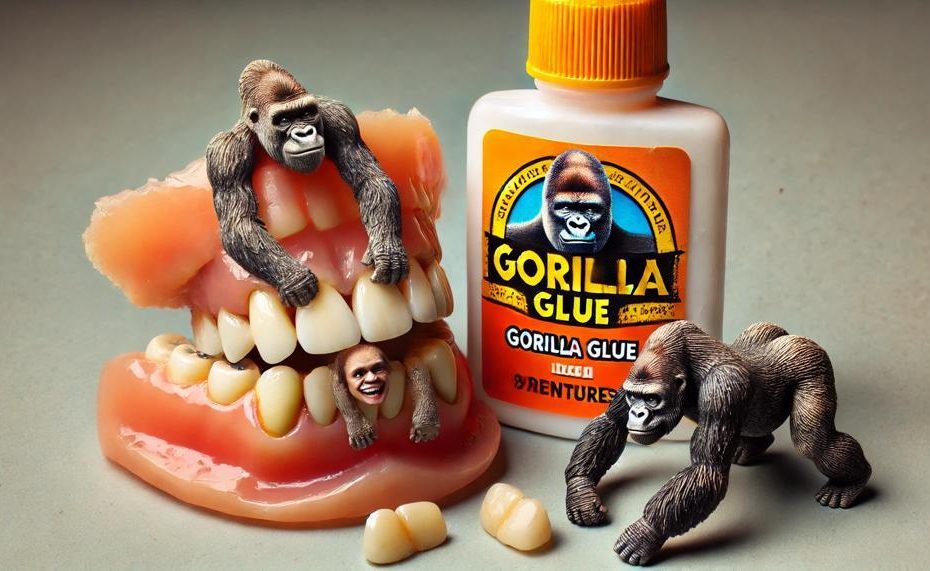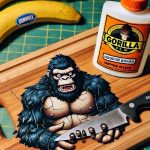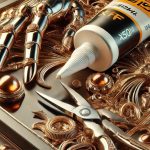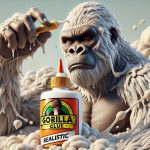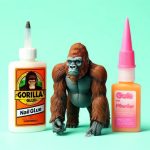No, Using Gorilla Glue on Dentures is Not Recommended
While Gorilla Glue may seem like a quick fix for repairing cracked or broken dentures, dental professionals strongly advise against using this industrial-strength adhesive on oral appliances. The expanding, rigid nature of Gorilla Glue makes it unsuitable for the flexibility required for a proper denture fit and function. Key takeaways:
• Gorilla Glue can warp and distort the precise fit of dentures as it expands and dries.
• The inflexible bond created is not designed to withstand the repetitive forces of biting and chewing.
• Removing excess glue requires hazardous solvents or abrasives that can further damage the denture material.
• Affordable denture repair services from dental professionals ensure a safe, long-lasting, and comfortable result.
Rather than risking an improper fit, bite misalignment, or additional damage with Gorilla Glue, it’s best to seek professional denture repair. This introduction clearly advises against a DIY Gorilla Glue fix while highlighting the expertise and reliable solutions provided by dental prosthetists.
Table of Contents
Can You Use Gorilla Glue On Dentures?
No, Gorilla Glue is not safe to use on dentures. Here’s why:
| Drawbacks of Using Gorilla Glue on Dentures | Explanation |
| Ruins denture fit | The expanding property of Gorilla Glue can cause further separation of broken denture pieces, altering the fit. |
| Damages denture appearance | Excess glue or sanding/chiseling to remove hardened glue can scratch and discolor the denture material. |
| Inadequate bonding strength | Gorilla Glue is not designed to withstand the chewing forces that dentures endure, leading to potential breakage. |
| Health risks | Removing wet glue requires using toxic paint thinners, which can be ingested and cause harm if not done properly. |
Instead of using Gorilla Glue, it’s strongly recommended to seek professional assistance from a dentist or denture specialist for proper denture repair or replacement.
What Is Gorilla Glue?
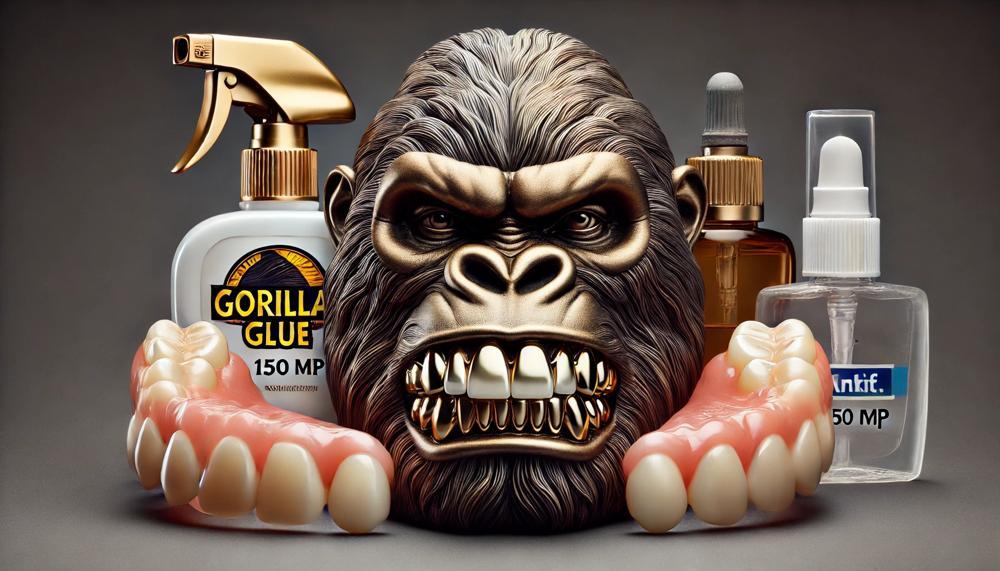
Gorilla Glue is a polyurethane adhesive that expands and dries into a rigid, durable bond. Its key ingredients include isocyanate and polyol, which react to form the strong, waterproof bond. While incredibly strong for general applications, Gorilla Glue is not recommended for use on dentures.
Using Gorilla Glue to repair dentures can have several drawbacks:
- Excess glue can get on the denture surface, affecting its fit and appearance.
- The rigid bond may not withstand the forces of chewing, causing the denture to break again at the glued area.
- Removing excess wet glue with paint thinner is toxic, while allowing it to dry requires sanding or chiseling, altering the denture’s fit.
Dental professionals advise against using Gorilla Glue or similar adhesives for denture repairs. The stresses of chewing make glue an unsuitable material for this purpose. Instead, it’s recommended to seek professional help for denture repair or replacement to ensure proper fit, function, and safety.
Risks Of Using Gorilla Glue On Dentures
| Potential Risks | How to Avoid |
|
|
| Gorilla Glue, a powerful adhesive, is not formulated for use on dentures and can pose severe risks to oral health. Its strong bonding properties and potentially harmful chemicals make it unsuitable for denture repairs. Improperly repaired dentures may cause discomfort, irritation, and even toxicity if ingested. To avoid these risks, it is crucial to consult a dental professional for denture maintenance, adjustments, or replacements. They can recommend safe, specialized dental adhesives and provide expert guidance on proper denture care. | |
Safe Application Procedures
Applying gorilla glue on dentures is generally not recommended, as it can pose significant risks to your oral health and the integrity of your dentures. Gorilla glue is an extremely strong adhesive designed for industrial and construction purposes, not for use in the mouth or on dental appliances. Here are some key points to consider:
| Potential Risks | Safer Alternatives | Professional Recommendation |
|
|
|
The safest approach is to avoid using gorilla glue on dentures altogether. Instead, use denture adhesives specifically designed for oral use and follow the manufacturer’s instructions carefully. If you experience any issues with your dentures, it’s best to consult with a dental professional for proper evaluation and treatment.
Dentures are custom-made dental appliances that require specialized care and maintenance. Using an industrial-strength adhesive like gorilla glue can cause irreparable damage and pose serious health risks.
The Benefits Of Using Gorilla Glue For Denture Repair
Utilizing Gorilla Glue for denture repair is generally inadvisable and offers minimal benefits compared to specialized denture adhesives or professional repair services. The drawbacks significantly outweigh any perceived advantages. Here are the key points:
| Advantages | Disadvantages |
| – Readily available and inexpensive | – Not designed for oral use, potential health risks |
| – Strong adhesive properties | – Difficult to apply without excess, ruining fit and appearance |
| – Expanding formula can misalign denture surfaces | |
| – Excess glue removal requires toxic solvents or sanding | |
| – Unsuitable for withstanding chewing forces, leading to breakage | |
| – Dental professionals strongly advise against using household glues |
In essence, the potential risks and complications associated with using Gorilla Glue far surpass any minor convenience or cost savings. It is highly recommended to seek professional denture repair services or utilize specialized denture adhesives designed for safe and effective oral use.
Conclusion
Attempting to repair dentures with Gorilla Glue is akin to using a sledgehammer to fix a wristwatch – an overpowered and hazardous approach. This industrial-strength adhesive may seem convenient, but it poses severe risks that far outweigh any perceived benefits.
The rigid, expanding nature of Gorilla Glue can warp and misalign denture surfaces, ruining the precise fit vital for comfort and function. Removing excess glue requires toxic solvents or abrasive methods that further compromise the denture material.
Perhaps most concerning is the potential for chemical burns, irritation, or toxicity if the glue contacts oral tissues or is ingested. Dentures endure substantial chewing forces, which the inflexible Gorilla Glue bond cannot withstand, leading to inevitable breakage. Dental professionals emphatically advise against this ill-advised DIY repair, instead recommending specialized denture adhesives designed specifically for oral use or professional repair services.
Preserving your dentures – and your oral health – is paramount. Heed the expertise of those trained in this intricate field. A momentary lapse in judgment with Gorilla Glue could result in a costly, uncomfortable, and even dangerous situation.

